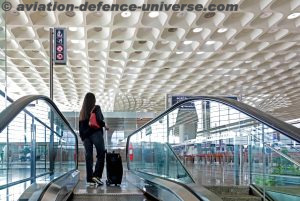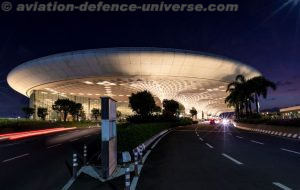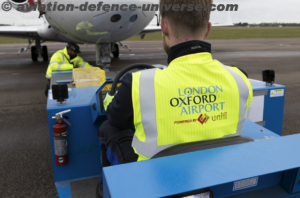- India’s first airport to launch a Hybrid Technology – Vertical Axis Wind Turbine (VAWT) & Solar PV System
 Mumbai. 10 October 2022. The aviation sector globally has a huge role to play in strengthening the sustainability pillars viz. environment, social and economic. The future depends on the sustainable work we do today! And staying committed to its sustainable goals, Mumbai’s Chhatrapati Shivaji Maharaj International Airport (CSMIA) has entirely switched to green sources for its energy consumption needs, making it one of India’s 100 percent sustainable airports. CSMIA was the first in India to launch hybrid technology which solely runs on green energy since April 2022, thus enabling a highly efficient and low carbon future for aviation. This sustainable initiative undertaken by CSMIA is part of the airport’s efforts that reduces its carbon footprint which further propels its journey towards ‘Net Zero’ emissions. Out of the total 100%, CSMIA procures around 5% of the airport’s electricity requirement through its onsite solar generation and the rest 95% from other green sources such as hydro & wind energy. Ushering into a sustainable future, CSMIA witnessed a rise in natural energy procurement with 57% green consumption in April 2022 to a whopping 98% between May to July. And finally attained the landmark 100% utilization of renewable sources of energy in August 2022. CSMIA is ISO 50001:2018 (Energy Management System) and ISO 14001:2015 certified company. The airport is committed to continuous reduction in energy consumption and carbon footprint through various initiatives. Moreover, CSMIA initially undertook the measure of installing 1.06MW rooftop solar power plant, which the airport eventually strengthened to 4.66 MW. This effort was recognised by the Confederation of India Industry (CII) where CSMIA was awarded the National Award for Excellence in Energy Management Excellent Energy.
Mumbai. 10 October 2022. The aviation sector globally has a huge role to play in strengthening the sustainability pillars viz. environment, social and economic. The future depends on the sustainable work we do today! And staying committed to its sustainable goals, Mumbai’s Chhatrapati Shivaji Maharaj International Airport (CSMIA) has entirely switched to green sources for its energy consumption needs, making it one of India’s 100 percent sustainable airports. CSMIA was the first in India to launch hybrid technology which solely runs on green energy since April 2022, thus enabling a highly efficient and low carbon future for aviation. This sustainable initiative undertaken by CSMIA is part of the airport’s efforts that reduces its carbon footprint which further propels its journey towards ‘Net Zero’ emissions. Out of the total 100%, CSMIA procures around 5% of the airport’s electricity requirement through its onsite solar generation and the rest 95% from other green sources such as hydro & wind energy. Ushering into a sustainable future, CSMIA witnessed a rise in natural energy procurement with 57% green consumption in April 2022 to a whopping 98% between May to July. And finally attained the landmark 100% utilization of renewable sources of energy in August 2022. CSMIA is ISO 50001:2018 (Energy Management System) and ISO 14001:2015 certified company. The airport is committed to continuous reduction in energy consumption and carbon footprint through various initiatives. Moreover, CSMIA initially undertook the measure of installing 1.06MW rooftop solar power plant, which the airport eventually strengthened to 4.66 MW. This effort was recognised by the Confederation of India Industry (CII) where CSMIA was awarded the National Award for Excellence in Energy Management Excellent Energy.
In line with its vision CSMIA has prepared roadmap to achieve “Net Zero Carbon Emission” by 2029. In April 2022, CSMIA enhanced its capacity usage of green energy and deployed a 10Kwp Hybrid SolarMill consisting of 2 Kwp TurboMill (3 Savonious type VAWT) and 8 Kwp Solar PV modules with an estimated minimum energy generation of 36 Kwh/day. This first-of-its-kind, fully integrated, hybrid renewable energy product, harnesses solar and wind energy combined to generate electricity. This green transition to renewable energy ensures a reduction of around 1 lac 20 thousand tonnes of CO2 equivalent (tCO 2 e) every year, thus moving closer to CSMIA’s target of Net Zero by the year 2029. CSMIA implemented Carbon Accounting and Management System (CAMS) based on ISO 14064-1:2018 to identify, measure & manage Green House Gas (GHG) emissions. CSMIA is the first Indian airport to have participated in Airport Carbon Accreditation (ACA) program of Airports Council International (ACI) in 2012.
 Speaking on the occasion, CSMIA’s spokesperson said – “We are extremely delighted to achieve this key milestone in our journey towards attaining a sustainable future for CSMIA. Quick wins do not create high-level of impact on the environment, thus, CSMIA has always been determined to focus on long-term transformations. The diligent efforts of the airport in undertaking several thoughtful initiatives, has paved the way to achieve this feat. With several accolades in recognizing energy usage and sustainable efforts under the belt, CSMIA over the years has been acknowledged by globally acclaimed organizations, for its efficient management of energy consumption. As CSMIA aspires to become net-zero by 2029, this landmark event further encourages us to stay committed to our efforts in enhancing the operational efficiency of the airport while operating on fully renewable energy”.
Speaking on the occasion, CSMIA’s spokesperson said – “We are extremely delighted to achieve this key milestone in our journey towards attaining a sustainable future for CSMIA. Quick wins do not create high-level of impact on the environment, thus, CSMIA has always been determined to focus on long-term transformations. The diligent efforts of the airport in undertaking several thoughtful initiatives, has paved the way to achieve this feat. With several accolades in recognizing energy usage and sustainable efforts under the belt, CSMIA over the years has been acknowledged by globally acclaimed organizations, for its efficient management of energy consumption. As CSMIA aspires to become net-zero by 2029, this landmark event further encourages us to stay committed to our efforts in enhancing the operational efficiency of the airport while operating on fully renewable energy”.
CSMIA has been inching towards the reduction of carbon emissions under its Environment Social and Governance (ESG) policy commitments. With continued focus on sustainability, CSMIA, year-on-year undertakes effective measures and sustainable practices, that display the airports’ firm belief & responsibility of contributing towards the global sustainability plan. Furthermore, CSMIA aims to reduce approximately 3000 tonnes of GHG emissions by conversion of belt-driven fans of Air handling units (AHUs) with EC fans, replacement of cooling tower fills with energy efficient fills, replacement of conventional lamps with LEDs, to conserve energy further. The airport also aims to adapt an IOT (internet of things) based temperature monitoring system at Terminal 2 to optimize the energy consumption of the air conditioning
system through technological upgradation in its pipeline, and conversion of conventional fuel vehicles with electric vehicles (EV). Confident in its transformational green practices, CSMIA is the only Indian airport to publish its biennial Sustainability report showcasing the progress of sustainability initiatives and presents an overview of its programs from the past two years.
For the aviation industry, two identified clear priorities that push for challenging change for a better tomorrow is (i) the shift to sustainable aviation fuel (SAF), a transition that is now seen in India (ii) and the second is the need to develop sustainable airports. At CSMIA, sustainability is an intrinsic concept, and its initiatives align with the United Nations (UN) Sustainable Development Goals and is prepared in accordance with Global Reporting Initiatives (GRI) standards, thus meeting the global environmental requirements. CSMIA over the years has envisaged several sustainable innovations and projects such as green building designs, operational measures that allowed it to meet with ACA Level 3+ NEUTRALITY” in 2016-17 and
is in the advanced stage to achieve ACA level 4+ Transition. For CSMIA, sustainability is ingrained in its core business strategy and is an integral part for it to progressively improve the operations and continue to serve in a responsible manner.




























































































































